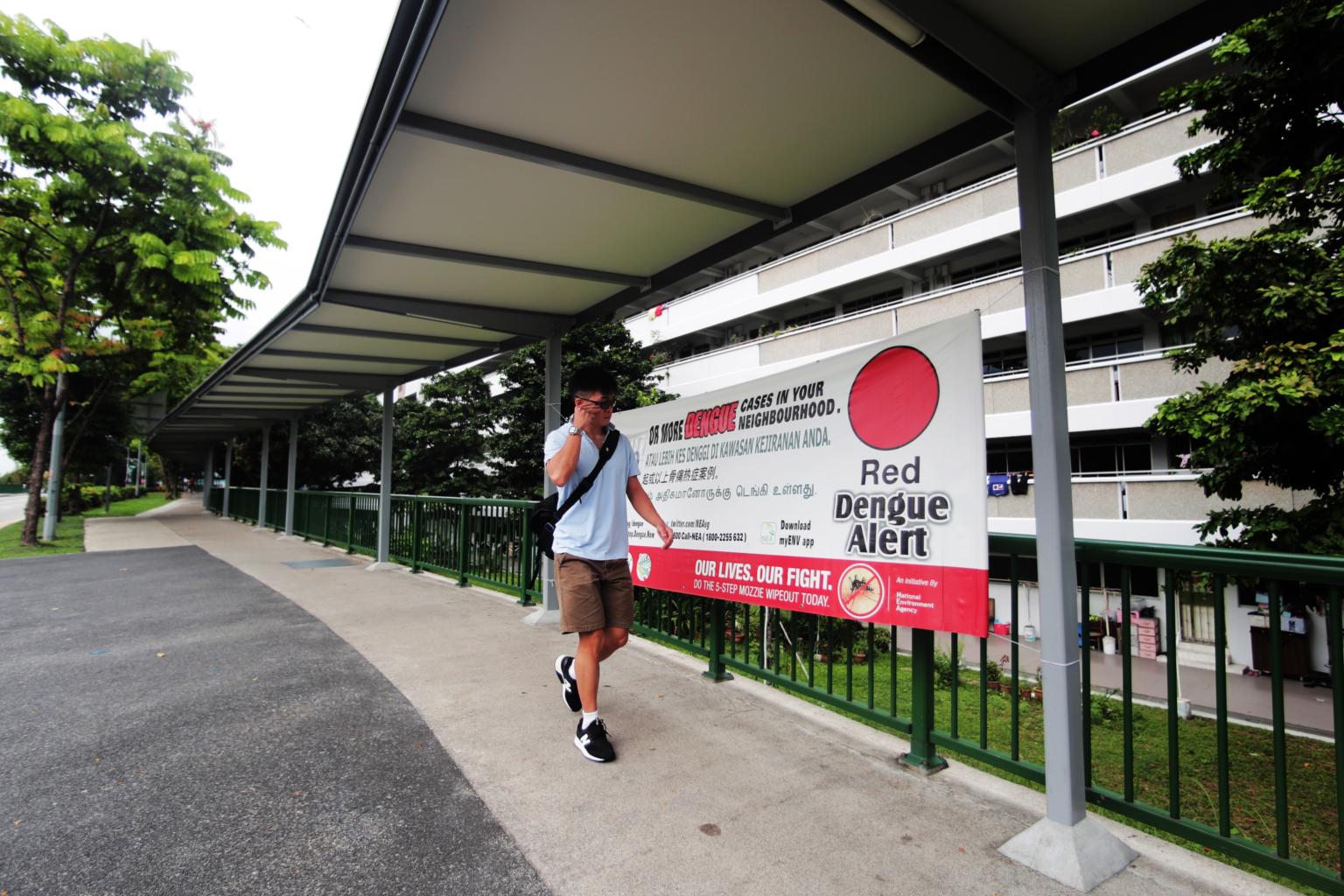Dengue cases rise fivefold from last year; NEA advises public to mosquito-proof homes before travelling
Sign up now: Get ST's newsletters delivered to your inbox

A Red Dengue Alert banner in Jurong West Street 61 on Nov 21, 2019. The number of dengue cases rose by five-fold from last year.
ST PHOTO: KELVIN CHNG
Follow topic:
SINGAPORE - Residents planning to go overseas for the year-end holidays should make their homes mosquito-proof before travelling, the National Environment Agency (NEA) said, amid a spike in the number of dengue cases here.
Its advisory comes as the number of dengue cases rose fivefold from last year. From the beginning of the year until last Saturday, there were 14,658 dengue cases, an increase of about 5½ times compared with the same period last year.
However, this number is two-thirds that of the volume of cases seen during the 2013 dengue outbreak, which had 22,170 cases for the whole year.
The number of dengue cases could rise further, NEA said in its advisory on Wednesday (Nov 27), adding: "For example, in 2013 and 2015, there were year-end spikes in the number of dengue cases, and on both occasions, we entered the following year with an atypically high number of dengue cases."
There are 76 active dengue clusters, with the five largest in Choa Chu Kang Avenue 2, Elias Road, Jalan Bangau and Begonia Lane near Yio Chu Kang, and Jurong West Street 61.
Most mosquito breeding sites found in these clusters are within residential premises.
In the light of the year-end holiday season, NEA advised residents to cover floor traps and toilet bowls, and seal off overflow pipes of flushing cisterns before travelling overseas.
Residents should also add sand granular insecticide to places where mosquitoes could breed and where stagnant water cannot be removed.
They should clear debris and blockages, place BTI insecticide in roof gutters and turn over water storage containers and wipe the rims dry.
They can also ask a relative or close friend to help check their homes regularly for stagnant water if they are going away for a long period of time, and leave their contact details with neighbours or the neighbourhood police post or centre, so that they can be reached easily.
NEA said that the week of Nov 11 was the fifth straight week in which infections had risen. The number of infections came down last week.
The agency said that there are multiple reasons for the high number of dengue cases in recent weeks, including the large population of Aedes mosquitoes, warmer temperature and low immunity in the human population.
It added that the Aedes mosquito population grew by 32 per cent last month over September. The number of larvae breeding sites found in homes was also 55 per cent higher over the same period.
The agency said it has distributed Gravitrap surveillance data to town councils and other parties like members of the Inter-Agency Dengue Task Force to help them target areas with a larger mosquito population and prioritise dengue prevention and control measures.
Gravitraps are small black cylinders that trap female Aedes aegypti mosquitoes looking for water surfaces to lay eggs on.
NEA and the Inter-Agency Dengue Task Force have continued to inspect dengue cluster areas. Between January and September, about 703,000 inspections were conducted islandwide, and NEA uncovered about 11,700 mosquito breeding habitats.
About 6,300 enforcement actions were taken against owners of homes and buildings for mosquito breeding in the same period.
The agency has also shared with town councils and other parties information about areas with a higher mosquito population, so that more preventive measures can be taken in these areas.
"All residents living in dengue cluster areas are strongly encouraged to cooperate with NEA officers and to facilitate checks (by the officers) and indoor misting in their homes," the agency said.
"Residents living in dengue cluster areas are also strongly encouraged to protect themselves by applying mosquito repellent regularly and keeping their homes free of stagnant water."

